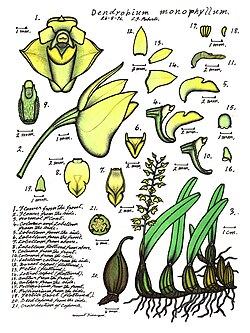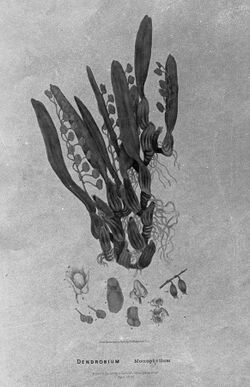Biology:Dendrobium monophyllum
| Lily-of-the-valley orchid | |
|---|---|

| |
| Illustration by Lewis Roberts | |
| Scientific classification | |
| Kingdom: | Plantae |
| Clade: | Tracheophytes |
| Clade: | Angiosperms |
| Clade: | Monocots |
| Order: | Asparagales |
| Family: | Orchidaceae |
| Subfamily: | Epidendroideae |
| Genus: | Dendrobium |
| Species: | D. monophyllum
|
| Binomial name | |
| Dendrobium monophyllum F.Muell.[1]
| |
| Synonyms[1] | |
| |
Dendrobium monophyllum, commonly known as the lily-of-the-valley orchid,[2] is an epiphytic or lithophytic orchid in the family Orchidaceae. It has pale green to yellowish pseudobulbs with one or two leaves, and between five and twenty bell-shaped yellow flowers. It grows in rainforest in New South Wales and Queensland, Australia.
Description
Dendrobium monophyllum is an epiphytic or lithophytic herb that usually forms clumps. Its pseudobulbs are pale green to yellowish, 60–120 mm (2–5 in) long and 20–30 mm (0.8–1 in) in diameter and furrowed. The pseudobulb has one or two thin, bright green leaves 80–120 mm (3.1–4.7 in) long, 25–30 mm (0.98–1.2 in) wide on the end. Between five and twenty resupinate, bell-shaped, yellow flowers 6–8 mm (0.24–0.31 in) wide are borne on a flowering stem 100–200 mm (4–8 in) long. The dorsal sepal is egg-shaped, 6–7 mm (0.24–0.28 in) long and about 3 mm (0.1 in) wide. The lateral sepals are triangular, 4–5 mm (0.16–0.20 in) long and about 4 mm (0.2 in) wide. The petals are 6–7 mm (0.24–0.28 in) long and about 2 mm (0.08 in) wide. The labellum is about 7 mm (0.3 in) long, 5 mm (0.2 in) wide and blunt with two ridges along its midline. Flowering occurs from August to December.[2][3][4]
Taxonomy and naming
Dendrobium monophyllum was first formally described in 1859 by Ferdinand von Mueller from a specimen collected near Moreton Bay by William Hill. The description was published in Fragmenta phytographiae Australiae.[5][6] The specific epithet (monophyllum) is a Latinization of the ancient Greek word monophyllon (μονόφυλλον), derived from the ancient Greek words monos (μόνος) meaning "single" or "alone" and phyllon (φύλλον) meaning "leaf".[7]
Distribution and habitat
The lily-of-the-valley orchid grows on trees, rocks and cliffs and on well-lit upper branches of rainforest trees between the Atherton Tableland in Queensland and Grafton in New South Wales.[2][4]
References
- ↑ 1.0 1.1 "Dendrobium monophyllum". World Checklist of Selected Plant Families (WCSP). Royal Botanic Gardens, Kew. http://wcsp.science.kew.org/namedetail.do?name_id=58434.
- ↑ 2.0 2.1 2.2 Jones, David L. (2006). A complete guide to native orchids of Australia including the island territories. Frenchs Forest, N.S.W.: New Holland. pp. 378–379. ISBN 1877069124.
- ↑ "Factsheet - Australorchis monophylla". Centre for Australian National Biodiversity Research (CANBR), Australian Government. 2010. http://www.canbr.gov.au/cpbr/cd-keys/RFKOrchids/key/rfkorchids/Media/Html/Australorchis_monophylla.htm.
- ↑ 4.0 4.1 Weston, Peter H.. "Dendrobium monophyllum". Royal Botanic Garden Sydney. http://plantnet.rbgsyd.nsw.gov.au/cgi-bin/NSWfl.pl?page=nswfl&lvl=sp&name=Dendrobium~monophyllum. Retrieved 28 November 2018.
- ↑ "Dendrobium monophyllum". https://id.biodiversity.org.au/instance/apni/505224. Retrieved 28 November 2018.
- ↑ von Mueller, Ferdinand (1859). Fragmenta phytographiae Australiae. Melbourne: Victorian Government Printer. p. 189. https://www.biodiversitylibrary.org/item/7218#page/197/mode/1up. Retrieved 28 November 2018.
- ↑ Backer, C.A. (1936). Verklarend woordenboek der wetenschappelijke namen van de in Nederland en Nederlandsch-Indië in het wild groeiende en in tuinen en parken gekweekte varens en hoogere planten (Edition Nicoline van der Sijs).
Wikidata ☰ Q15458999 entry
 |


